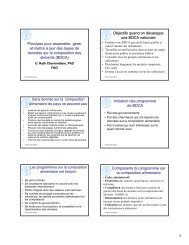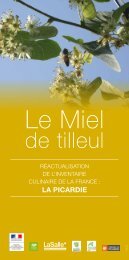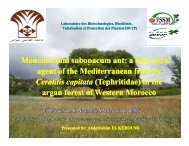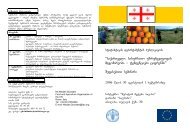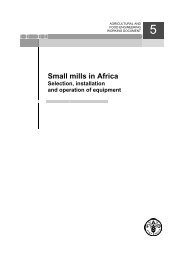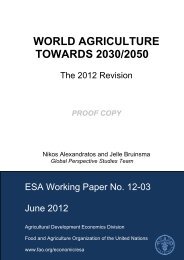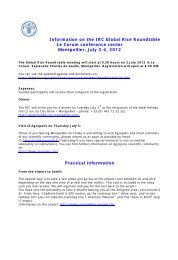Climate Change and Food Security: setting the track for the ... - FAO
Climate Change and Food Security: setting the track for the ... - FAO
Climate Change and Food Security: setting the track for the ... - FAO
Create successful ePaper yourself
Turn your PDF publications into a flip-book with our unique Google optimized e-Paper software.
42. Tim Williams from <strong>the</strong> University of Georgia, USA<br />
I would like to suggest that missing from <strong>the</strong> scope of <strong>the</strong> proposed HLPE is <strong>the</strong> idea of<br />
determining <strong>the</strong> most cost-effective solutions, <strong>and</strong> <strong>the</strong> areas where <strong>the</strong> greatest priorities lie.<br />
When faced with <strong>the</strong> cost of responding to climate change nations may take more urgently <strong>the</strong><br />
alternative option of preventing that change. Ideally we should have costs of both options.<br />
Can we estimate <strong>the</strong> cost of rolling back carbon dioxide relative to <strong>the</strong> cost of developing<br />
technologies to address <strong>the</strong> consequences of global warming?<br />
Very clearly, addressing climate change is very expensive <strong>and</strong> perhaps will take much longer<br />
than innovative new solutions to get control of atmospheric carbon dioxide. I think in terms of<br />
strategy to have alternatives might be more effective than presenting <strong>the</strong> world with a bill <strong>for</strong><br />
one option only.<br />
Good evening,<br />
Tim Williams<br />
43. Edward Mut<strong>and</strong>wa from <strong>the</strong> Rw<strong>and</strong>a Development Agency, Rw<strong>and</strong>a [2 nd<br />
contribution]<br />
Dear FSN Moderator,<br />
I would like to corroborate with <strong>the</strong> views of Prof Ominawo from Nigeria who emphasizes <strong>the</strong><br />
need <strong>for</strong> an effective early warning system on climate change. Obviously, many smallholder<br />
farmers are at <strong>the</strong> mercy of <strong>the</strong> climate change problem because <strong>the</strong>y often to do not have prior<br />
in<strong>for</strong>mation about what could happen in terms of flooding or drought. <strong>Change</strong>s in climatic<br />
patterns will impact on <strong>the</strong> types of crops to be grown, <strong>the</strong> farming methods to be used, <strong>and</strong><br />
ultimately <strong>the</strong> yield obtained, nutrition <strong>and</strong> food security. I have observed in some parts of East<br />
Africa that farmers are now using short season varieties as a way of adapting but many of <strong>the</strong>se<br />
varieties do not really fit into farmers' tastes. Un<strong>for</strong>tunately, <strong>the</strong> predictive power of <strong>the</strong>se<br />
models is not 100% due to <strong>the</strong> interaction of so many o<strong>the</strong>r determinants of climate change. We<br />
need to focus on <strong>the</strong> current methods/techniques as an adaptation strategy <strong>for</strong> early warning in<br />
<strong>the</strong> proposed literature review, <strong>the</strong>ir merits/de-merits <strong>and</strong> suitability in different contexts.<br />
Thanks,<br />
Edward Mut<strong>and</strong>wa,<br />
RDA, Rw<strong>and</strong>a<br />
44. Sarah Ayeri from <strong>the</strong> Centre <strong>for</strong> Development Research, Kenya<br />
Dear Moderator,<br />
I appreciate <strong>the</strong> insights from various scientists <strong>and</strong> I must say, am encouraged by all <strong>the</strong>se<br />
suggestions. However, pertinent issues need to be solved pertinently! My worry is, that we often<br />
<strong>for</strong>get <strong>the</strong> would be users or target groups we are working <strong>for</strong> to solve issues of climate change<br />
<strong>and</strong> food security. These are <strong>the</strong> farmers whe<strong>the</strong>r in a rural <strong>setting</strong> or urban <strong>setting</strong>. We all know<br />
that <strong>the</strong>y would be <strong>the</strong> most affected by <strong>the</strong> impacts of climate change <strong>and</strong> since most of <strong>the</strong>m in<br />
Africa are still dependent on rainfed agriculture, I would suggest that we involve <strong>the</strong>m in this.<br />
While we are all aware of how science has defined climate change, we are not aware how<br />
__________________________________<br />
Global Forum on <strong>Food</strong> <strong>Security</strong> <strong>and</strong> Nutrition<br />
http://km.fao.org/fsn<br />
30



